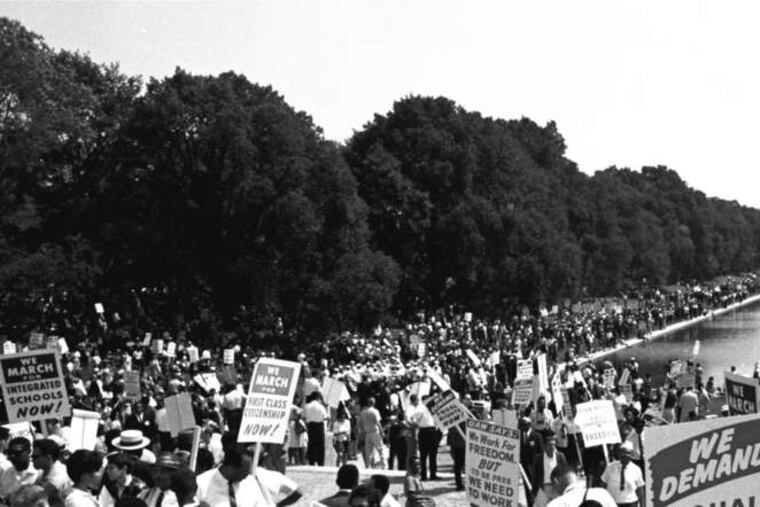
Michael G. Long
teaches at Elizabethtown College and is the editor of "I Must Resist: Bayard Rustin's Life in Letters" (City Lights Books)
West Chester native Bayard Rustin had just eight weeks to plan the March on Washington for Jobs and Freedom, and by all accounts, his leadership was visionary and masterly. It's no doubt part of the reason he will be posthumously awarded the Presidential Medal of Freedom in November. The prestigious award, coupled with the attention he has received in media coverage of the 50th anniversary of the march, means Rustin is finally emerging from the shadows of history.
He has been there a long time.
As a former communist, and especially as an openly gay man in the Age of Closets, Rustin often worked with colleagues who did their best to keep him deep in the long shadows they cast. The story of Rustin and the Rev. Dr. Martin Luther King Jr. in 1960 is particularly shocking.
In June of that year, Rustin arranged for King and the great labor leader A. Phillip Randolph to announce that they would lead nonviolent demonstrations at the national conventions of both parties. After hearing the announcement, Rep. (and the Rev.) Adam Clayton Powell Jr., of Harlem, wanted to squash the march on the Democrats, so he enlisted an intermediary to phone King with a threat: Unless the civil rights leader called off the march, Powell would tell the media that King and Rustin were having an affair.
They were not; the threat was hollow.
But King was not a profile in courage at this point. Fearful that such a rumor would irrevocably taint him, and feeling pressure from conservative Baptist ministers in the movement, he cut Bayard out of his inner circle of advisers.
It was a brutal act of discrimination.
Until that moment, Rustin had engineered much of the construction of Martin Luther King Jr. He had schooled King in Gandhian nonviolence and tactics, ghostwritten some of his speeches and articles, built him his first national platform at the 1957 Prayer Pilgrimage for Freedom, steered him to practice coalition politics with labor and liberals, and even helped to conceive of and organize the Southern Christian Leadership Conference.
Rustin was "crushed," according to Rachelle Horowitz, his longtime friend and assistant - crushed that he was no longer even in the shadows.
But two years later, King came calling again. During the Birmingham campaign in 1963, King longed for Rustin's tactical advice - Rustin once said King could not organize a couple of vampires to go to a bloodbath - and took steps to reintegrate Rustin into the inner sanctum of the movement. Rustin "lit up," according to Horowitz, and went rushing back.
But why? Why would he ever go back to a man who had hurt him so deeply? To a movement that had sought to marginalize him?
"Bayard was just a forgiving person, especially toward Dr. King," says Walter Naegle, Rustin's longtime companion.
Rustin was also resilient - a virtue he no doubt learned from Julia Rustin, his spiritually fierce grandmother, who reared him in West Chester. Schooled by the Quakers, Julia was a leader in her local A.M.E. church, a founding member of the local NAACP branch, and a community activist dedicated to helping those in need, including her beloved grandson.
When West Chester's finest neglected to offer Rustin a scholarship for college, even though he had earned more "honor points" than any other graduating senior, Julia put on her nicest dress and started knocking on doors. Her determination paid off when she landed in the office of Bishop R.R. Wright, a wealthy A.M.E. minister in Philadelphia, who saw fit to help Rustin win a music scholarship to Wilberforce University in Ohio.
Bayard fondly remembered his grandmother as a "dealer in relieving misery." Year after year, she taught him to embrace not only the Quaker belief that the best way to set captives free is by using the spiritual weapons of nonviolence, but also the black church's conviction that God demands the liberation of the oppressed right here and right now. So whenever you have a chance to free the slaves, move it!
Rustin never stated his exact reasons for going back to King, but we are deeply indebted to him for returning to the fire. Because of his ability to forgive and move on, we learned how to march that glorious day 50 years ago - how to harness our passion and use nonviolence and direct-action techniques in pursuit of equal justice under law.
Perhaps even more important, Rustin taught us to believe in ourselves, in our own ability to transform individuals and societies steeped in discrimination, deaf to the calls of compassion, and yet never beyond redemption.